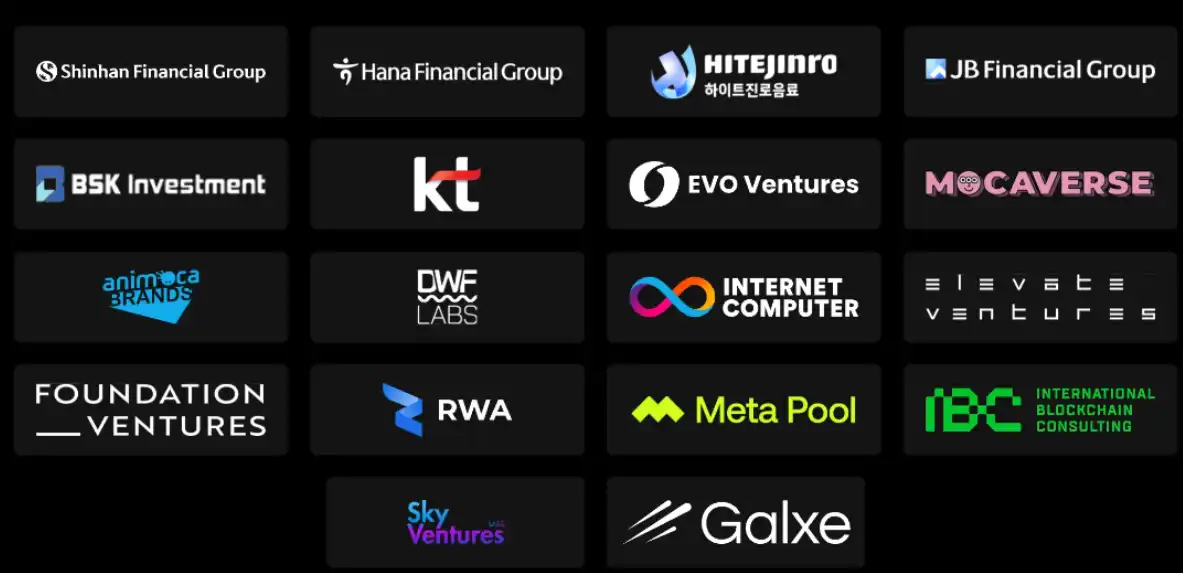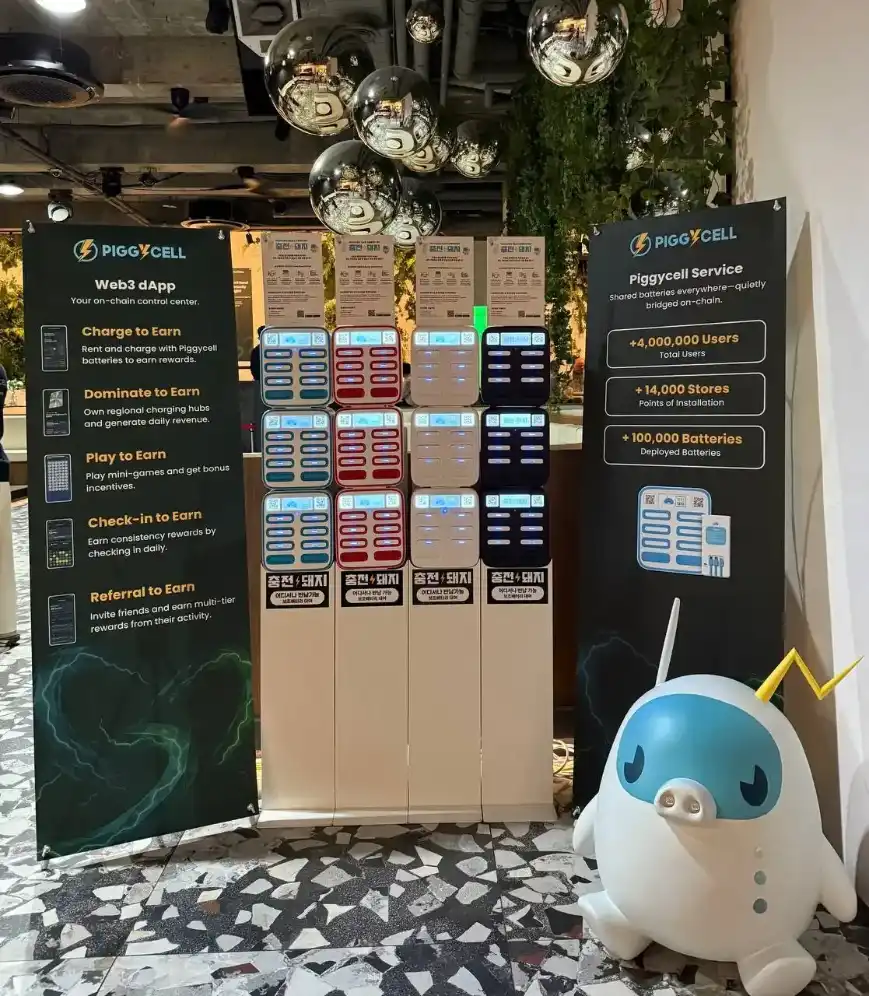How South Korea's leading power bank sharing service, Piggycell, is building a fully inclusive Real-World Asset (RWA)
Piggycell is planning to launch its TGE in the fourth quarter of this year, aiming to bring participation opportunities to global users.
Over the past decade, the sharing economy has been one of the most iconic innovations in global business. From the initial Airbnb turning idle rooms into hotels, to Uber transforming cars into taxis, and to the boom of local life services like WeWork and DiDi. Global users first realized that dormant resources could be transformed into usable value through digital platform matching and rule restructuring.
Of course, this model also faces some challenges, such as trust issues, high fees, opaque user data, and inefficient capital flow. Today, RWAs are injecting new vitality into the sharing economy, aiming to address previous pain points.
RWA involves tokenizing real-world tangible or intangible assets through blockchain technology, allowing them to be divided, traded, and managed like cryptographic assets. Each token represents a certain ownership or stake in the asset. The latest data from RWA.xyz shows that the total market value of global on-chain RWAs has exceeded $300 billion, with traditional financial giants like BlackRock and Franklin Templeton deeply involved.
In this wave, Piggycell, starting from daily infrastructure, has digitized the mobile power bank network into investable assets, becoming a pioneer in the physical infrastructure RWA field.
Unlike other projects starting from scratch, Piggycell is an absolute leader in the shared mobile power bank sector in Korea, holding a 95% market share. With over 13,000 charging stations deployed nationwide in Korea, over 100,000 power bank devices, and 4 million paying users.
In a recent public test, Piggycell generated over 9.4 million on-chain records in two weeks. Additionally, Piggycell has completed a $10 million seed round of financing, with investors including Shinhan Financial Group, Hana Financial Group, Korean domestic institutions, as well as global top Web3 investors like Animoca Brands, DWF Labs, Internet Computer.
From a technological and background perspective, Piggycell has received high recognition from the industry and capital. Introducing blockchain technology on top of a robust business model and solid operational foundation is not a trend-driven hype but rather aims to enhance the transparency and efficiency of the entire system, bringing fundamental innovation to the sharing economy model.
Charging and Governance Mining, Reshaping the Shared Power Bank Business
Piggycell is not attempting to rebuild a blockchain version of shared power banks but starting from the underlying asset value confirmation and circulation. The business logic of the sharing economy is sound; the issue lies in the platformization and centralization of the mechanism design. By combining the transparency of blockchain, tokenization incentives, and smart contract automatic execution, it is possible to redefine the profit distribution model of the sharing economy.
The Web3 transformation of Piggycell is not simply adding a token, but is a systematic design around data empowerment, asset on-chainification, and revenue sharing, elevating itself from a mere sharing platform to a composite protocol integrating RWA, DePIN, and the sharing economy.
Within the Web3 framework, Piggycell integrates a blockchain reward mechanism into the shared charging business, forming the two core models of "Charge-to-Earn" and "Dominate-to-Earn," enabling both consumer behavior and infrastructure contributions to be transformed into investment returns.
In traditional sharing models, users are the sole payers. However, in Piggycell's Charge-to-Earn model, when users rent a power bank, they not only complete a charging session but also receive a certain amount of PIGGY tokens as a reward. The reward amount is allocated based on actual usage and the normal operating time of the owned device, ensuring incentive alignment with user behavior. This model transforms "daily consumption" into "asset accumulation," significantly enhancing user stickiness and engagement. Just as Play-to-Earn ignited the popularization of GameFi in the past, Piggycell's Charge-to-Earn also has the potential to catalyze DePIN.
If Charge-to-Earn targets ordinary users, then Dominate-to-Earn incentivizes infrastructure contributors. Piggycell allows individuals and communities to control shared energy infrastructure through NFT-based ownership. Each NFT represents the digital twin of each Piggycell node's physical device. Anyone can purchase an NFT for a mobile charging station in a specific geographic area and become a shareholder of that area's infrastructure. NFT holders can proportionally receive real-time cash flow dividends generated by the device. For example, a user could purchase an NFT tied to a charging station near Seoul University, and as students regularly use that charging station, the NFT holder will receive PIGGY token rewards based on tracked power consumption.
This model allows ordinary individuals for the first time to participate in the physical infrastructure of the sharing economy with a low barrier to entry, enjoying the long-term value brought by stable cash flow and addressing the opaque benefits to asset contributors in traditional sharing economies.
Despite the complexity of the underlying technology, Piggycell still maintains a high level of user-friendliness in user experience, achieving a level of convenience comparable to Web2. Users only need to scan the QR code on the charging station to borrow a power bank, supporting mainstream payment methods such as WeChat Pay, Kakao Pay, Naver Pay, and more. The app interface is intuitive and clear, displaying real-time charging progress, battery levels, and reward points. The entire process does not require switching between apps or additional operations, significantly reducing the usability threshold. After charging is completed, users can return the device to any station, further enhancing convenience. This seamless experience breaks the stereotype of blockchain applications being complex and difficult to use, allowing ordinary users to easily participate in Web3.
Market and Capital Dual Validation Based on Technological Strength, Global Expansion
Piggycell is not just a concept on paper but a project that has been validated through technological implementation and business practices.
Within a mere two weeks of the testing phase, its on-chain system generated over 9.4 million transaction records. This breakthrough is not only numerical but, more importantly, signifies the demanding requirements of the shared power bank business on blockchain throughput and stability. Piggycell's system has demonstrated the ability to process millions of transactions, proving its technological reliability and scalability.
Furthermore, every user's consumption and each revenue distribution are recorded on the chain, validating Piggycell's decentralized vision and providing users with unprecedented transparency and trust. This practice has positioned Piggycell as a truly data-backed DePIN and RWA project, setting it apart from projects that remain merely at the conceptual stage.
As South Korea's largest shared power bank network, Piggycell has already secured a market share and user base ahead of its competitors. Its executives have made it clear that Piggycell is not just a project in the whitepaper but a company that creates value through operational performance and stable cash flow.
Currently, Piggycell has attracted $10 million in seed funding from South Korean publicly listed companies such as Shinhan Financial Group, Hana Financial Group, HiteJinro, JB Financial Group, as well as well-known Web3 institutions like Animoca Brands, DWF Labs, and Galxe.

This scale of funding not only provides ample capital for Piggycell's global expansion but also serves as a strong endorsement of its innovative model and long-term growth potential by international investors. Moving forward, Piggycell will expand its decentralized energy infrastructure globally.
Reshaping the Sharing Economy with an RWA Strategy, Piggycell's TGE Approaching
According to the roadmap, Piggycell will launch an Energy as a Service (EaaS) platform, which is a fully decentralized marketplace where individuals, small businesses, and even chain stores can register, lease, or transform energy equipment, including portable power banks, wall chargers, and mobile charging stations. This model assigns users a new role, shifting them from passive consumers to active infrastructure providers. Through smart contracts, the interaction between lessees and providers becomes transparent and automated, with programmable fee structures and usage-based payment systems ensuring equitable distribution of interests. Additionally, the platform will introduce equipment health audits and insurance options to establish a reliable trust and verification system, ensuring the healthy operation of the entire market.
The potential of this model can be clearly seen in the practice of the well-known new energy vehicle brand NIO. NIO, through its V2G technology, turns electric vehicles into distributed energy storage units that can interact bidirectionally with the grid. This means users can charge their vehicles during off-peak hours when electricity prices are lower and sell excess electricity back to the grid during peak hours, thereby earning additional income.
Combining NIO with Piggycell's EaaS platform would bring even broader prospects. When NIO's users access the Piggycell platform, they can diversify their income by leasing out their vehicle's energy storage function to other scenarios requiring mobile energy, such as outdoor events or temporary stalls when the vehicle is idle. This model creates additional revenue streams beyond selling electricity back to the grid. More importantly, the Piggycell platform can integrate with navigation apps or electric vehicle delivery platforms through APIs, enabling cross-platform interoperability. This model not only reduces users' recharging costs but also empowers them to profit from energy trading, turning their vehicles into energy assets with financial attributes.
In addition, Piggycell will leverage its robust on-chain data to accurately calculate carbon savings and green charging events. These verified activities can be connected to carbon credit issuance and sold or retired by individual users or businesses. Through this approach, Piggycell is expected to provide a decentralized real-time ESG compliance and reporting solution, becoming a prime example of ESG investment implementation.
Currently, Piggycell has become a focal point of attention in the South Korean Web3 community, with industry insiders optimistic about its growth prospects under the RWA strategy. The official announcement stated that Piggycell will host a series of events during the Korea Blockchain Week (KBW) to engage deeply with the community.

Meanwhile, Piggycell plans to launch its TGE in the fourth quarter of this year, aiming to provide a participation opportunity for global users. With its strong cash flow and innovative on-chain empowerment, Piggycell has set a new benchmark for the commercialization of physical infrastructure and decentralized integration. In the future, as the RWA market develops and application scenarios expand, Piggycell is undoubtedly worth continuous attention and anticipation.
Disclaimer: The content of this article solely reflects the author's opinion and does not represent the platform in any capacity. This article is not intended to serve as a reference for making investment decisions.
You may also like
New spot margin trading pair — BARD/USDT!
BTC/ETH VIP Earn Ultimate Carnival is officially here!
New spot margin trading pair — FLOCK/USDT!
0GUSDT now launched for pre-market futures trading
